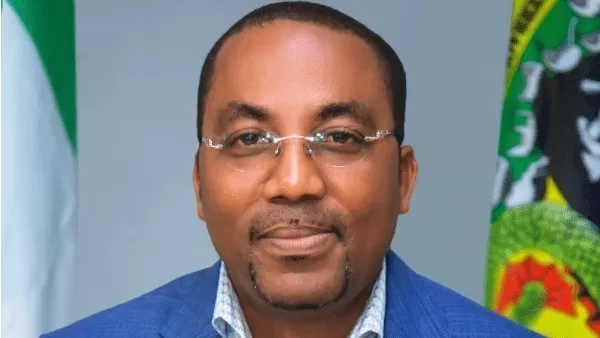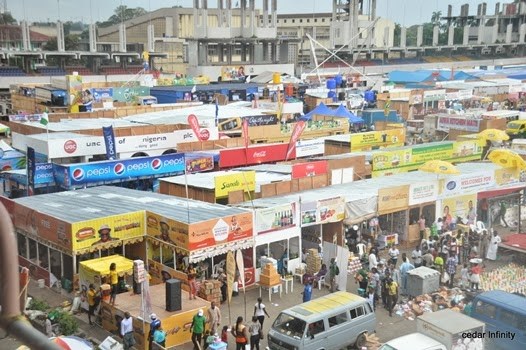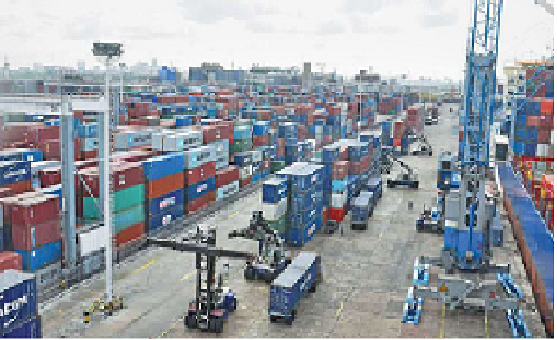BUSINESS
NPA Committed to Elimination of Systemic Corruption at Nation’s Seaports – NPA DG

By Joseph Amah, Abuja
Managing Director of Nigerian Ports Authority (NPA), Mohammed Bello Koko, has reiterated the organisation’s commitment to the elimination of systemic corruption and other criminal practices at the nation’s seaports. He has equally affirmed the authority’s position to operate in compliance with the standard operating procedures (SOPs) as stipulated in the Nigerian Port Process Manual (NPPM), a project it funded, to enhance operational excellence and service delivery at all Nigerian seaports and terminals.
The MD NPA made these remarks recently when he received members of the Maritime Anti-Corruption Network (MACN) led by Soji Apampa, at the Authority’s head-office in Marina, Lagos.
Koko stated that the NPA Management appreciates the positive being played by the network in partnership with key sister agencies and organizations to create a more friendly environment for doing business in the nation’s maritime industry.He also commended the group for promoting the gains of business integrity and raising awareness on the negative impact of corruption on the country’s image and global rating. The NPA helmsman expressed delight that the anti-corruption reforms introduced by the Buhari led Federal Government has significantly reduced corrupt and related criminal practices in the Nigerian port and shipping sector.
In his words, “the NPA Management under my watch is happy to note that we are doing well in view of the drop in the incidences of corruption to 5 from over 150 cases when this anti-corruption campaign started. We have seen the progress being recorded in all aspect of port operations as well as revenue into government coffers, it shows that sooner than later, the port industry in Nigeria would become the most attractive maritime cluster in the region, going by our market share and capacity”, he declared.
Leader of the MACN team, Soji Apampa, explained that the purpose of their visit is to intimate the Authority about the achievements recorded, in collaboration with other key stakeholders, to engender zero tolerance to corruption in the port as well as remove opaqueness in port operations in line with international best practice.
He mentioned that the Nigerian port ecosystem has witnessed a positive change in the last three years, as reported demands made by corrupt public officials on ship-masters and shipping agents in the process of vessel clearance has reduced from three to two digits. “The introduction of the SOPs and NNPM has increased the level of transparency around processes to be complied with in Nigerian ports.
The introduction of the Port Service Support Portal has also made complaints and grievance handling processes more transparent and effective”. He further said that his group from 2017 has trained over a thousand personnel serving in the port, including staff of NPA, Nigeria Customs Service, Nigerian Immigrations Service and other agencies, across all port locations in the country.
Apampa appealed to the NPA Management to sustain the collaboration with his group. He requested for increased support in terms of logistics and manpower deployment, whilst assuring the NPA Management of the group’s readiness to provide technical support and training to staff of the Authority, in view of MACN’s affiliation with the World Maritime University.
Agriculture
NNPC Foundation Empowers Vulnerable Farmers in Oyo, Osun

No fewer than 500 farmers on Tuesday benefited from the NNPC Foundation agricultural training initiative for vulnerable farmers in Osun and Oyo States.
The training, marking the flag-off in the South-West zone of Nigeria, was held at the Ilora Baptist Grammar School, Ilora, Oyo State.
The foundation manages the Corporate Social Responsibility (CSR) initiatives of NNPC Limited, focusing on education, health, environment and energy access to communities nationwide.
The Managing Director of the foundation, Mrs Emmanuella Arukwe, said the initiative demonstrated the commitment to food security and economic empowerment for Nigerian farmers.
Arukwe, who was represented by Dr Bala David, the foundation’s Executive Director, Programme Development, said the project aimed to build resilience, boost productivity and promote sustainable agriculture.
“We are training 6,000 farmers across six zones in climate-smart practices, modern techniques, quality inputs, and market access,” she said.
She, therefore, urged farmers to participate actively and embrace the opportunity to help secure Nigeria’s food and economic future.
Mr Olasunkanmi Olaleye, Oyo State Commissioner for Agriculture and Rural Development, commended NNPC Foundation for the training and empowerment programme.
Olaleye, who was represented by Mr Olusegun Ezekiel, the ministry’s Director of Regulation and Enforcement, said empowering vulnerable farmers was crucial in addressing national food security challenges.
He added that the initiative aligned with Oyo State’s agricultural transformation agenda of Gov. Seyi Makinde.
“We remain committed to supporting initiatives that uplift farmers and improve productivity and livelihoods,” Olaleye said.
He encouraged participants to make the most of the training opportunity to improve their practices.
He also called for future collaboration between the foundation and the ministry to achieve greater impact.
The training consultant, Prof. Daniel Ozok, described vulnerable farmers as smallholders with an under-five-hectare farm size, mainly made up of women, youth, and the elderly.
“These farmers are most affected by climate shocks, hence the need for focused training,” Ozok said.
According to him, training equips them with modern techniques and strategies for improved productivity and market access.
Some of the participants expressed gratitude to NNPC Foundation and promised to apply the knowledge gained from the training.
NAN reports that a medical screening exercise was organised by the foundation for participants on the sidelines of the training.
Training initiative would later be held for farmers in Ekiti and Ondo States on a date different from that of Ogun and Lagos States. (NAN)
Economy
Customs Zone D Seizes Contraband Worth N110m

The Nigeria Customs Service (NCS), Federal Operation Unit (FOU), Zone D, has seized smuggled goods worth over N110 million between April 20 till date.
The Comptroller of Customs, Abubakar Umar, said this at a news conference on Tuesday in Bauchi.
He listed the seized items to include 11,200 litres of petrol; 192 bales of second hand clothing, 140 cartons of pasta, 125 pairs of jungle boots, 47 bags of foreign parboiled rice and 9.
40 kilogramme of pangolin scales.Umar said the items were seized through increased patrols, intelligence-led operations, and strengthened inter-agency collaboration.
The comptroller said the pangolin scales would be handed over to the National Environmental Standards and Regulations Enforcement Agency (NESREA) for appropriate action, while the seized petrol would be auctioned, and the proceeds remitted to the federation account.
He attributed the decrease in smuggling activities of wildlife, narcotics, and fuel to the dedication and professionalism displayed by the personnel in line with Sections 226 and 245 of the NCS Act 2023.
The comptroller enjoined traders to remain law abiding, adding the service would scale up sensitisation activities to combat smuggling.
“We remain resolute in securing the borders and contributing to Nigeria’s economic development,” he said.
The FOU Zone D comprises Adamawa; Taraba, Bauchi, Gombe, Borno, Yobe, Plateau, Benue and Nasarawa. (NAN)
Economy
Trade Tensions: Global Economy Stands at Fragile Turning Point -UN

The UN Department of Economic and Social Affairs (UN DESA) has said that the global economy stands at a fragile turning point amid escalating trade tensions and growing policy uncertainties.UN DESA, in a report published on Thursday, stated that tariff-driven price pressures were adding to inflation risks, leaving trade-dependent economies particularly vulnerable.
It stated that higher tariffs and shifting trade policies were threatening to disrupt global supply chains, raise production costs, and delay key investment decisions – all of this weakening the prospects for global growth. The economic slowdown is widespread, affecting both developed and developing economies around the world, according to the report.For instance, in the United States, growth is projected to slow “significantly”, as higher tariffs and policy uncertainty are expected to weigh on private investment and consumer spending.Several major developing economies, including Brazil and Mexico, are also experiencing downward revisions in their growth forecasts.China’s economy is expected to grow by 4.6 per cent this year, down from 5.0 per cent in 2024. This slowdown reflects a weakening in consumer confidence, disruptions in export-driven manufacturing, and ongoing challenges in the Chinese property sector.By early 2025, inflation had exceeded pre-pandemic averages in two-thirds of countries worldwide, with more than 20 developing economies experiencing double-digit inflation rates.This comes despite global headline inflation easing between 2023 and 2024.Food inflation remained especially high in Africa, and in South and Western Asia, averaging above six per cent. This continues to hit low-income households hardest.Rising trade barriers and climate-related shocks are further driving up inflation, highlighting the urgent need for coordinated policies to stabilise prices and protect the most vulnerable populations.“The tariff shock risks hitting vulnerable developing countries hard,” Li Junhua, UN Under-Secretary-General for Economic and Social Affairs, said in a statement.As central banks try to balance the need to control inflation with efforts to support weakening economies, many governments – particularly in developing countries – have limited fiscal space. This makes it more difficult for them to respond effectively to the economic slowdown.For many developing countries, this challenging economic outlook threatens efforts to create jobs, reduce poverty, and tackle inequality, the report underlines. (NAN)
























